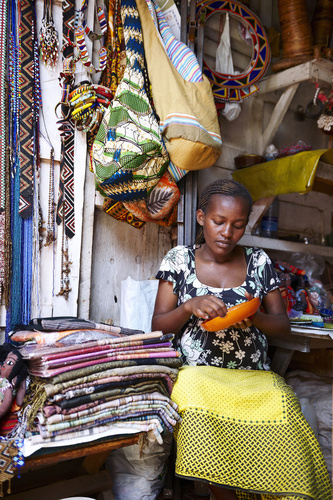In sub-Saharan Africa [alone],
women devote at least 16 million hours a day — 5.8 billion hours a year — just
to collecting drinking water (Mercy Corp). That is in just one country in a
continent that is short on water in many areas. The point is the fact that
these women have to spend so much time on basic survival they can do little
else. If their basic needs were met, how much more time would they have to care
for their families, help their communities and create or produce products that
would net them income for a better life?
Women in these types of countries make up a talented,
creative sector of the textile and fashion industry: those who are able, have
the resources and the time to produce such items. These are items that
culturally unique and made by hand, or even in garment or production shops,
where the pay is laughable and the hours are long. Beautiful, brilliant,
amazing items, apparel, accessories, home decor and so many things that we love
to buy to add these cultural spirits to our own lives and style. Think of all
the beautiful and spirited fashions and textiles that you love. Imagine the
person from whose hands they were made. Now imagine not being able to purchase
these types of things. Imagine if women were not denied the resources they need
what all they could create.
As women, men, as people, as humans and consumers,
especially those of the fashion industry, it is our duty to assist these women
in their need for empowerment. One place this begins is with the fight for gender
equality for not only the women of sub-Saharan Africa ,
but women worldwide.
According to Mercy Corp, “In many places around the world,
females have unequal access to important resources like information, money,
school, jobs and land. And they are oftentimes not allowed to make decisions
for themselves or their families, like who they will marry, how many children
they will have, how they will spend their time or how to spend household
income. . . And with fewer skills and tools at their disposal, women and girls
also end up being some of the most vulnerable when crises like war and natural
disaster strike. . . The challenges that girls and women face vary widely from
culture to culture, but one theme is prevalent: Unequal access to opportunities
that give them an independent, productive place in their communities.”
Let us do all that we may to assist these women worldwide in
their empowerment so that they too may come to be confident in their skills,
lives and achievements and contributions that they may make to their families,
communities, and to the world at large.
Please visit the Mercy Core website on women and genderequality to find out more and to find out ways that you may help or make a
donation. You may also help by sharing this article with everyone you know and
especially to those of you readers who support the fashion industry and would
love to see these women flourish in their creativity. We can all do our part to
bring awareness to the need for empowerment of women everywhere. Think about
it. What if this was you?



No comments:
Post a Comment